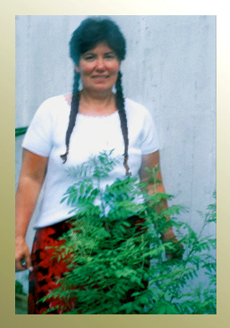 Nancy Basket learned pine needle basketry from her friend, Judy Arledge, in 1981. She met a Cherokee man, Mr. Lee, in Yakima, Washington at a bead store. He shared his family collection of pine needle baskets with her and the stories behind them. The collection included a cradle board and an effigy bear basket. After offering to buy the collection, he told her, "Your job isn't to buy these baskets. Your job is to make them." Nancy remembered what he told her and to get more instruction, she helped form the first basketry guild in the US. in recent times. This Seattle, Washington group, The Vi Phillips/Northwest Basketweavers Guild is still active. (note: rye straw Bee Skep basket makers had basketry guilds until the mid 1800's when these bell shaped hives were outlawed and white boxes for bees were made mandatory.)
Nancy Basket learned pine needle basketry from her friend, Judy Arledge, in 1981. She met a Cherokee man, Mr. Lee, in Yakima, Washington at a bead store. He shared his family collection of pine needle baskets with her and the stories behind them. The collection included a cradle board and an effigy bear basket. After offering to buy the collection, he told her, "Your job isn't to buy these baskets. Your job is to make them." Nancy remembered what he told her and to get more instruction, she helped form the first basketry guild in the US. in recent times. This Seattle, Washington group, The Vi Phillips/Northwest Basketweavers Guild is still active. (note: rye straw Bee Skep basket makers had basketry guilds until the mid 1800's when these bell shaped hives were outlawed and white boxes for bees were made mandatory.)
She moved to Illinois where she helped form another basketry guild and experimented with cattail leaves as no pine needles grew there. Teaching her skill at national basketry conventions, she found that pine needle baskets took too long, cost too much (bundled pine needles sold then for $14 a lb.) and the students wanted bigger baskets for their money. In 1989, she moved to SC to be closer to the Long Leaf pines so she could collect her own needles.
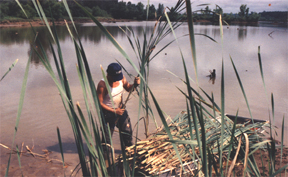 In SC, Nancy was juried into the SC Arts Commission as an artist in education. Traveling to different parts of the state she found that split kudzu vines translated into baskets quicker and easier for students but not all areas had that either. So she adapted the materials to whatever plant species grew closest to the school. This insured the availability of economically viable resources for all income levels. Teaching at a rural private school with no budget for 150 students grades K-12 also helped her create low cost, environmental friendly, recycled projects. Students and teacher learned together how to make kudzu paper work. Native stories of respect were told through that medium and encouraged writing skills. Kudzu paper art became a business that helped feed her family encouraging Nancy to experiment with more basket forms and functions, thus the variety of materials used and shapes in her work.
In SC, Nancy was juried into the SC Arts Commission as an artist in education. Traveling to different parts of the state she found that split kudzu vines translated into baskets quicker and easier for students but not all areas had that either. So she adapted the materials to whatever plant species grew closest to the school. This insured the availability of economically viable resources for all income levels. Teaching at a rural private school with no budget for 150 students grades K-12 also helped her create low cost, environmental friendly, recycled projects. Students and teacher learned together how to make kudzu paper work. Native stories of respect were told through that medium and encouraged writing skills. Kudzu paper art became a business that helped feed her family encouraging Nancy to experiment with more basket forms and functions, thus the variety of materials used and shapes in her work.
For the last 15 years, Nancy has researched and shared her basketry and storytelling skills at Primitive Skills gatherings, Powwows, through the National Indian Education Association NIEA as a presenter of traditional and contemporary baskets. 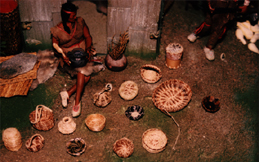 The Schiele Museum in Gastonia, NC purchased Nancy's miniature baskets representing many American indigenous cultures to display in one of their dioramas. The Barnwell Museum purchased her pine needle Cradleboard after it toured the US in the Wyoming Western Show. Nancy shares basketry and storytelling through the Pickens County Museum and Hagood Mill. The McKissick Museum recognized Nancy as a master basket maker in an apprenticeship program to a Catawba woman. She was given a grant by the SC Arts Commission to make a book of her basketry designs. In 1992 her two chapters were included in the book Natural Basketry. Credit was given to the Arts Commission for their support of her work. Two movie companies commissioned her basketry skills in the TV series, Young Indiana Jones where Nancy made a hot air balloon basket out of cattail leaves, and The Last of the Mohicans where she made cattail leaf mats, bark baskets and corn husk masks. One of her sons helped make the mats.
The Schiele Museum in Gastonia, NC purchased Nancy's miniature baskets representing many American indigenous cultures to display in one of their dioramas. The Barnwell Museum purchased her pine needle Cradleboard after it toured the US in the Wyoming Western Show. Nancy shares basketry and storytelling through the Pickens County Museum and Hagood Mill. The McKissick Museum recognized Nancy as a master basket maker in an apprenticeship program to a Catawba woman. She was given a grant by the SC Arts Commission to make a book of her basketry designs. In 1992 her two chapters were included in the book Natural Basketry. Credit was given to the Arts Commission for their support of her work. Two movie companies commissioned her basketry skills in the TV series, Young Indiana Jones where Nancy made a hot air balloon basket out of cattail leaves, and The Last of the Mohicans where she made cattail leaf mats, bark baskets and corn husk masks. One of her sons helped make the mats.
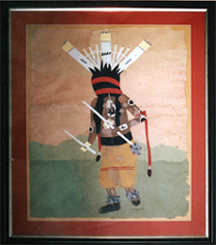 Several colleges have sponsored Nancy in workshops for their students and teachers, including, Lander, Converse, University of SC, Furman, and Columbia College. Clemson University, offered a week long, Native American Cultures course taught by Nancy and her friend Dr. Rebecca Moore that included basket making to all Oconee county teachers. SC and Alabama Educational TV have featured Nancy on several programs and SC is showing a video of her coiling a kudzu basket on their web site this spring along with a new TV segment. She works with the SC National Forest Service in lectures to their personnel and has been nominated for the Smithsonian's 2005 Folk Life Festival in Washington DC. Their theme will be The National Forest Service. Nancy works with community elders in retirement homes and she has taught for two weeks with the Delaware Department of Education with the Very Special Arts program. She loves working with the Juvenile Justice programs, such as the Aspen group that worked in Oconee County, John De La Howe in McCormick, and organizations like the White Path Center in Cherokee, NC. Nancy has been chosen as a fire starter and will be receiving training with the recovery and Wellbriety programs offered through the Native American organization, White Bison. She is a founding member of the Native American Prison Program NAPP here in SC.
Several colleges have sponsored Nancy in workshops for their students and teachers, including, Lander, Converse, University of SC, Furman, and Columbia College. Clemson University, offered a week long, Native American Cultures course taught by Nancy and her friend Dr. Rebecca Moore that included basket making to all Oconee county teachers. SC and Alabama Educational TV have featured Nancy on several programs and SC is showing a video of her coiling a kudzu basket on their web site this spring along with a new TV segment. She works with the SC National Forest Service in lectures to their personnel and has been nominated for the Smithsonian's 2005 Folk Life Festival in Washington DC. Their theme will be The National Forest Service. Nancy works with community elders in retirement homes and she has taught for two weeks with the Delaware Department of Education with the Very Special Arts program. She loves working with the Juvenile Justice programs, such as the Aspen group that worked in Oconee County, John De La Howe in McCormick, and organizations like the White Path Center in Cherokee, NC. Nancy has been chosen as a fire starter and will be receiving training with the recovery and Wellbriety programs offered through the Native American organization, White Bison. She is a founding member of the Native American Prison Program NAPP here in SC.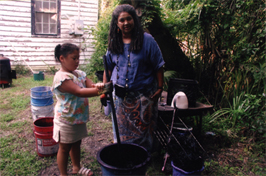
These traditions have been passed down to her children and grandchildren. Her oldest daughter, Jessica, is helping with the business end of basketry, and with the formation of their non profit organization, Native Traditions. She's only made one perfect basket, her daughter, Jaidreanna Lee Basket. Jaid, born in April 1998, has helped her Nana in public school residencies since late 1999. Joleen, the youngest, has been her mother's apprentice since she was 10 years old and makes beautiful pine needle baskets. After years of telling her children Native American stories of respect, one of Nancy's sons said, "Where are the pictures?" That started the kudzu leaf paper art cards, and that's the rest of the story.
